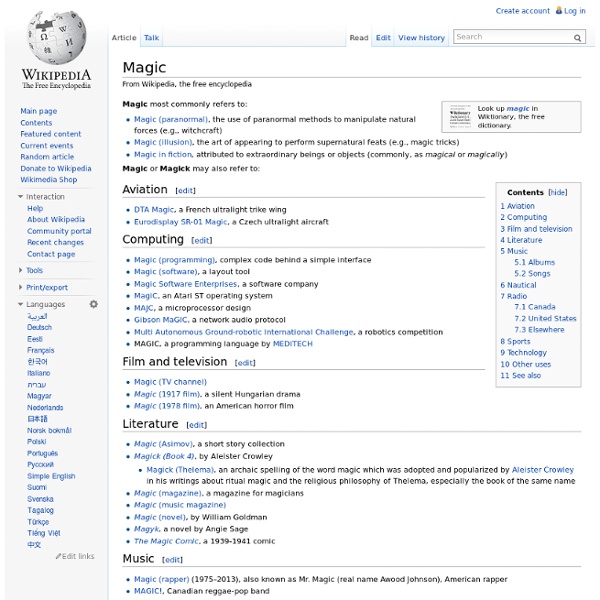



The Light of Egypt or the Science of the Soul and the Stars The Book of THOTH - The complete guide to the Tarot, Magick and Ordo Templi Orientis Ordo Templi Orientis (O.T.O.) ('Order of the Temple of the East' or 'Order of Oriental Templars') is an international fraternal and religious organization founded at the beginning of the 20th century. English author and occultist Aleister Crowley has become the best-known member of the order. Originally it was intended to be modelled after and associated with European Freemasonry,[1] such as Masonic Templar organizations, but under the leadership of Aleister Crowley, O.T.O. was reorganized around the Law of Thelema as its central religious principle. Similar to many secret societies, O.T.O. membership is based on an initiatory system with a series of degree ceremonies that use ritual drama to establish fraternal bonds and impart spiritual and philosophical teachings. O.T.O. also includes the Ecclesia Gnostica Catholica (EGC) or Gnostic Catholic Church, which is the ecclesiastical arm of the Order. History[edit] Origins[edit] O.T.O. and Aleister Crowley[edit] O.T.O. after Crowley[edit]
Three Books of Occult Philosophy De Occulta Philosophia, Libri tres Three Books of Occult Philosophy (De Occulta Philosophia libri III) is Heinrich Cornelius Agrippa's study of occult philosophy, acknowledged as a significant contribution to the Renaissance philosophical discussion concerning the powers of ritual magic and its relationship with religion. The three books deal with Elemental, Celestial and Intellectual magic. The books outline the four elements, astrology, kabbalah, numbers, angels, God's names, the virtues and relationships with each other as well as methods of utilizing these relationships and laws in medicine, scrying, alchemy, ceremonies, origins of what are from the Hebrew, Greek, and Chaldean context. These arguments were common amongst other hermetic philosophers at the time and before. Relation to the Knights Templar and magic use[edit] Three Books of Occult Philosophy helped perpetuate the belief in modern popular culture that the Knights Templar practiced witchcraft. See also[edit] References[edit]
Phoenixmasonry, Inc. Secret society "Secret Society Buildings at Yale College", by Alice Donlevy[1] ca. 1880. Pictured are: Psi Upsilon (Beta Chapter), 120 High Street. Left center: Skull & Bones (Russell Trust Association), 64 High Street. A secret society is a club or organization whose activities, events, and inner functioning are concealed from non-members. Anthropologically and historically, secret societies are deeply interlinked with the concept of the Mannerbund, the all-male "warrior-band" or "warrior-society" of pre-modern cultures (see H. A purported "family tree of secret societies" has been proposed, although it may not be comprehensive.[2] The Thuggee were a secret cult of assassins who worshipped the Hindu goddess Kali. Alan Axelrod, author of the International Encyclopedia of Secret Societies and Fraternal Orders, defines a secret society as an organization that: Is exclusive.Claims to own special secrets.Shows a strong inclination to favor its own. David V. Politics[edit] Revolutions[edit] References[edit]
Illuminati History The Owl of Minerva perched on a book was an emblem used by the Bavarian Illuminati in their "Minerval" degree. The Illuminati movement was founded on May 1, 1776 in Ingolstadt, Upper Bavaria as the Order of the Illuminati, and had an initial membership of five.[2] The founder was the Jesuit-taught Adam Weishaupt (d. 1830),[3] who was the first lay professor of canon law at the University of Ingolstadt.[1] The Order was made up of freethinkers as an offshoot of the Enlightenment and seems to have been modelled on the Freemasons.[4] Illuminati members took a vow of secrecy and pledged obedience to their superiors. Members were divided into three main classes, each with several degrees, and many Illuminati chapters drew membership from existing Masonic lodges. Fundamental changes occurred in the wake of the acceptance of Adolph Freiherr Knigge into the order. Knigge was a young author and Freemason who was steeped in the Western mystery traditions from an early age. Modern Illuminati
Ritual A priest elevates the Host during a Catholic Mass, one of the mostly widely performed rituals in the world. A ritual "is a sequence of activities involving gestures, words, and objects, performed in a sequestered place, and performed according to set sequence. Rituals of various kinds are a feature of almost all known human societies, past or present. The field of ritual studies has seen a number of conflicting definitions of the term. In psychology, the term ritual is sometimes used in a technical sense for a repetitive behavior systematically used by a person to neutralize or prevent anxiety; it is a symptom of obsessive–compulsive disorder. Etymology[edit] The English word "ritual" derives from the Latin ritualis, "that which pertains to rite (ritus)". Characteristics of ritual[edit] There are hardly any limits to the kind of actions that may be incorporated into a ritual. Formalism[edit] The use of Latin in a Tridentine Catholic Mass is an example of a "restricted code". Invariance[edit]
Freemasonry Freemasonry is a fraternal organisation that traces its origins to the local fraternities of stonemasons, which from the end of the fourteenth century regulated the qualifications of masons and their interaction with authorities and clients. The degrees of freemasonry, its gradal system, retain the three grades of medieval craft guilds, those of Apprentice, journeyman or fellow (now called Fellowcraft), and Master Mason. These are the degrees offered by craft, or blue lodge Freemasonry. The basic, local organisational unit of Freemasonry is the lodge. Masonic Lodge Palazzo Roffia, Lodge in Italy set out for French (Moderns) ritual The Masonic Lodge is the basic organisational unit of Freemasonry. The bulk of Masonic ritual consists of degree ceremonies. Most lodges have some sort of social calendar, allowing Masons and their partners to meet in a less ritualised environment.[7] Often coupled with these events is the obligation placed on every Mason to contribute to charity. History